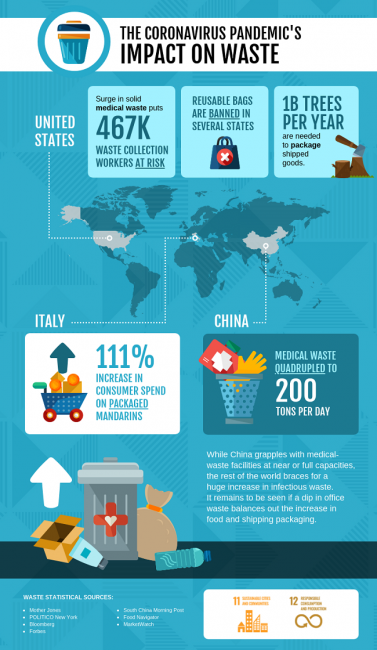
Medical waste
The huge demand for disposable medical products such as single-use gloves, surgical masks and empty IV bags in the wake of the pandemic has created a deluge of medical waste.
In Wuhan, China, the volume of medical waste is reported to have risen from 40 to 240 tons a day at the height of the epidemic, according to the South China Morning Post. Medical waste facilities in 29 cities were at or near full capacity.
Masks used by healthcare workers are sterilised and then go to landfill or are incinerated. But Chinese manufacturers were also making 116 million masks a day by the end of February. It’s unknown yet how quickly the public has been using and disposing of these masks–which the government suggests people wear in public.
The surge in solid medical waste is just beginning to confront the US. And not only is this an environmental issue, but it puts the 467,000 workers employed by the U.S. waste collection and disposal industry at risk.
The upside? The US has more capacity at its medical waste treatment centers than China does to deal with medical waste, says Bloomberg.
But that still doesn’t address the home garbage and recycling put out by both sick and asymptomatic individuals. So far provision of PPE and guidelines to protect waste workers have been scattershot.
Reusable packaging
Plastic packaging is enjoying an increase in popularity during the coronavirus pandemic. Seen as a more sanitary option, shopper spend in Europe on packaged food products is soaring.
In Italy, consumer spend on packaged mandarins rose over 111 percent in the week ending on March 8, versus the same period in 2019. This is despite the fact there’s been no evidence that either food or food packaging can transmit COVID-19.
In the US, reusable bags have been banned in New Hampshire, Illinois and Massachusetts, says MarketWatch. Republicans are lobbying Washington, New York and New Jersey to ban or delay their respective plastic bag bans.
The argument is that reusable bags are more likely to carry the coronavirus. While research has found the coronavirus can live for 72 hours on plastic, cloth wasn’t tested.
What is certain is in a 2015 study in the journal Science found that 275 million metric tons (MT) of plastic was produced in 192 coastal countries in 2010 — and 4.8 to 12.7 MT of that went into the ocean. The coronavirus pandemic is sure to accelerate this trend.
Online shopping packaging
About 165 billion packages are shipped in the US each year, with the cardboard used roughly equating to more than one billion trees, reported LimeLoop. Amazon and meal kit deliveries like Blue Apron are just two e-retailers contributing to the overflow of cardboard and plastic.
Now, with the public afraid to leave the house or under strict shelter in place rules, there’s been a surge in demand for online shopping.
In fact, Amazon’s sales have increased to the point that they announced they need to hire 100,000 new employees to meet demand. The fallout from this huge increase in packaging waste remains to be seen.
The United Nations predicts that there will be more plastic in the ocean than fish by 2050. The coronavirus pandemic will undoubtably accelerate this trend, while contributing to other problems–clogging drainage systems, litter and releasing pollutants when burned.
Commercial waste
An executive at a large waste company said 300 customers have already suspended service this week, reports Politico.
This is up from just 25 suspensions last Friday, meaning less commercial waste. The executive expects that number to grow to 1,000 soon. Whether this trend will balance out the increase in consumer waste discussed above remains to be seen.
Courtesy Venngage (venngage.com)
